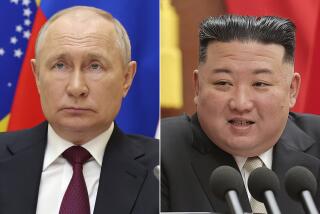Pakistan Sent Stingers to China, U.S. Aides Say : Arms: The report shows another leak, adding to fears that the potent antiaircraft missiles could end up in terrorist hands.
- Share via
WASHINGTON — Pakistan, which served as the intermediary in supplying American-made Stinger missiles to the Afghan moujahedeen during their war against the Soviet-backed government, has secretly made the sophisticated hardware available to China, U.S. intelligence officials have found.
According to informed sources, American intelligence officials reported late last year that China had obtained the Stingers and that Pakistan--a close and longstanding strategic partner of the Beijing regime--had been the supplier.
The reports document another highly sensitive leakage of American arms technology to a potentially dangerous recipient. They also appear to confirm the fears of American policy-makers years ago about opening access to a weapon that could be put to devastating use if it fell into the hands of terrorists.
The Stinger is a specially designed, high-tech but lightweight surface-to-air missile that can be easily carried overland and then fired at enemy aircraft. Supplied to the Afghan rebels in the mid-1980s after extensive debate, it was used to shoot down scores of Soviet planes and attack helicopters and helped turn the tide against the Soviet-backed Afghan government forces.
By obtaining copies of the Stinger, arms experts said, China could “reverse-engineer” them to learn how to manufacture and perhaps sell their own copies of the missiles. China also might be able to devise electronic countermeasures by which aircraft could evade the missiles.
It could not be determined whether China has used the Stingers in these ways. One foreign intelligence service is said to have concluded that China did produce its own version of the Stinger--reportedly a blend of the American-made missile and a Soviet missile.
A spokesman for Pakistan’s embassy in Washington insisted recently that the report “is incorrect. We have no information regarding this.” A Chinese spokesman did not reply to a request for comment.
The international traffic in the Stingers illustrates the extraordinary costs and benefits involved when the United States transfers one of its advanced weapons systems overseas.
The Stingers helped the moujahedeen to outlast the Soviet occupation of their country. But once the United States made the Stingers available to the Afghan rebels, it was unable to keep control over the weapons and technology. The Stingers have a special computer-sighting mechanism that locks on to the exhausts of aircraft engines.
In recent weeks, the Bush Administration has been trying to get Afghan rebel groups to return those Stingers not used against Soviet aircraft. One of the fears is that the missiles could fall into the hands of terrorists who might use them against civilian aircraft.
The United States now has developed a more advanced version of the missile, and it is possible that the technology for this newer version of the weapon has not reached the international market.
In 1990, the Bush Administration imposed a ban on direct U.S. military sales to Pakistan. It was carrying out a 1985 law that bars transfers of military equipment unless the President can certify to Congress that Pakistan “does not possess a nuclear explosive device.”
However, earlier this year it was disclosed that the Administration has been quietly allowing the Pakistani armed forces to buy U.S. arms from commercial firms. Administration officials have interpreted the 1985 law as covering only government-to-government sales.
One Capitol Hill source said recently that he doubts that public disclosure of Pakistan’s action in turning over Stingers to China will result in any new legislative action against Pakistan.
“They (the Pakistanis) are pretty much at rock bottom already around here (in Congress), so the practical effect may not be very great,” he said. Asked whether Congress might seek to revise the 1985 law to make clear that it covers commercial sales as well as U.S. military sales, the source said, “There aren’t the votes right now to do that.”
More to Read
Sign up for Essential California
The most important California stories and recommendations in your inbox every morning.
You may occasionally receive promotional content from the Los Angeles Times.












